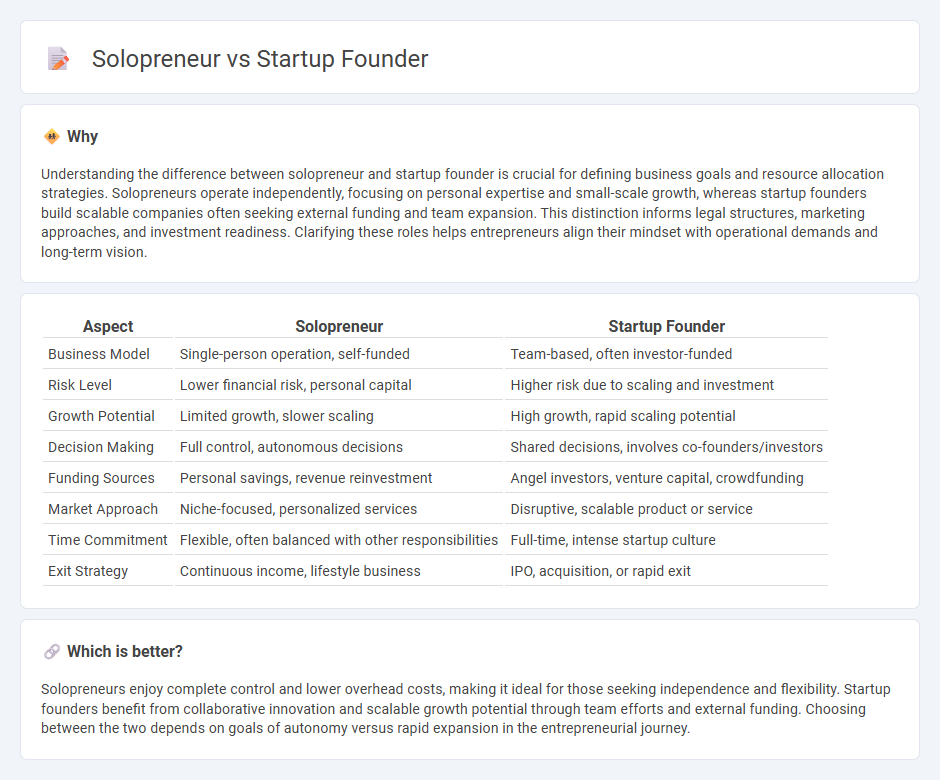
Solopreneurs independently manage every aspect of their business, focusing on maintaining full control and flexibility while often operating with limited resources. Startup founders typically lead a growing company with a scalable business model, seeking external funding and building a team to accelerate growth. Discover the key differences and strategies to thrive as either a solopreneur or a startup founder.
Why it is important
Understanding the difference between solopreneur and startup founder is crucial for defining business goals and resource allocation strategies. Solopreneurs operate independently, focusing on personal expertise and small-scale growth, whereas startup founders build scalable companies often seeking external funding and team expansion. This distinction informs legal structures, marketing approaches, and investment readiness. Clarifying these roles helps entrepreneurs align their mindset with operational demands and long-term vision.
Comparison Table
| Aspect | Solopreneur | Startup Founder |
|---|---|---|
| Business Model | Single-person operation, self-funded | Team-based, often investor-funded |
| Risk Level | Lower financial risk, personal capital | Higher risk due to scaling and investment |
| Growth Potential | Limited growth, slower scaling | High growth, rapid scaling potential |
| Decision Making | Full control, autonomous decisions | Shared decisions, involves co-founders/investors |
| Funding Sources | Personal savings, revenue reinvestment | Angel investors, venture capital, crowdfunding |
| Market Approach | Niche-focused, personalized services | Disruptive, scalable product or service |
| Time Commitment | Flexible, often balanced with other responsibilities | Full-time, intense startup culture |
| Exit Strategy | Continuous income, lifestyle business | IPO, acquisition, or rapid exit |
Which is better?
Solopreneurs enjoy complete control and lower overhead costs, making it ideal for those seeking independence and flexibility. Startup founders benefit from collaborative innovation and scalable growth potential through team efforts and external funding. Choosing between the two depends on goals of autonomy versus rapid expansion in the entrepreneurial journey.
Connection
Solopreneurs and startup founders share a foundational drive for innovation and business creation, often navigating early-stage challenges such as market validation and funding acquisition. Both roles require exceptional adaptability, strategic planning, and a strong focus on customer needs to scale their ventures effectively. The primary distinction lies in scale, with solopreneurs typically managing solo operations while startup founders build teams to accelerate growth and achieve broader market impact.
Key Terms
**Startup Founder:**
Startup founders typically lead innovative ventures with high-growth potential, aiming to scale rapidly by securing external funding from investors such as venture capitalists or angel investors. They often manage diverse teams, develop scalable business models, and focus on market disruption within competitive industries like tech, biotech, or clean energy. Explore more about the specific roles, strategies, and growth pathways unique to startup founders.
Scalability
A startup founder prioritizes scalability by developing a business model designed for rapid growth and attracting external investment to expand operations quickly. In contrast, a solopreneur typically focuses on sustainable, steady income with limited scalability since the business relies primarily on individual effort and skills. Discover key strategies and differences in scalability between startup founders and solopreneurs to optimize your entrepreneurial approach.
Venture Capital
Startup founders typically seek venture capital to scale rapidly and capture significant market share, while solopreneurs often rely on personal funding or smaller investments, prioritizing sustainable growth and operational control. Venture capital firms favor startups with scalable business models, strong teams, and clear exit strategies, making founders more attractive candidates for large investments. Explore the key distinctions between these entrepreneurial paths to understand funding strategies and growth potential.
Source and External Links
Startup Founders & Entrepreneurs: What's the Difference? | Built In - A startup founder is someone who originates a new company by turning an innovative idea that fills a market need into reality, dedicating significant effort to build products or services that solve specific problems within an industry.
Startup Founders and Co-Founders -- Everything You Need to Know - A founder creates the startup from an idea and may do so alone or with co-founders, who contribute essential skills early on to help launch and grow the company successfully.
What We Look for in Founders - Paul Graham - Key qualities of successful startup founders include determination, flexibility, and imagination, with determination being critical as founders must overcome many obstacles while building their companies.
 dowidth.com
dowidth.com